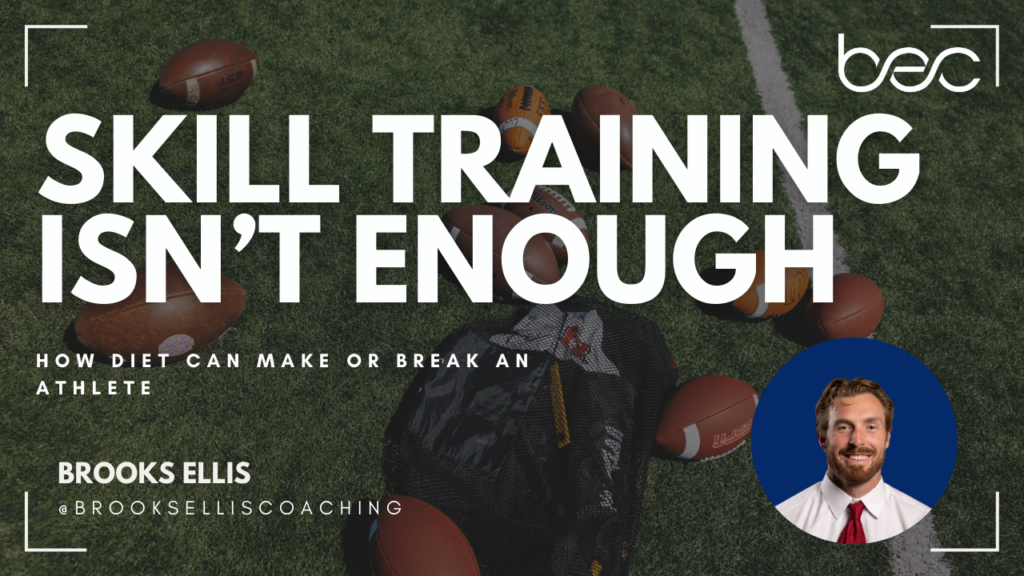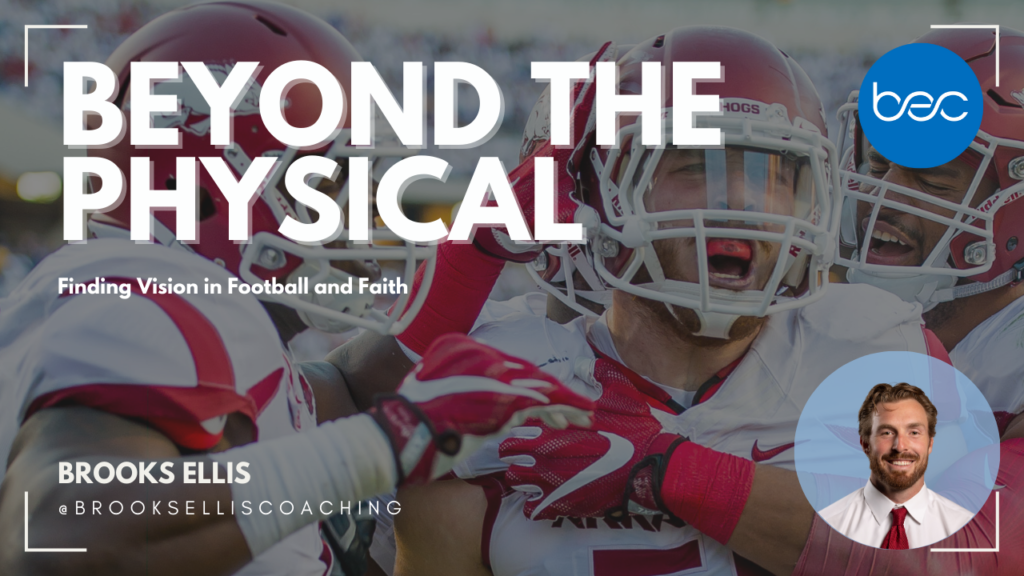As a Young Athlete, I Thought My Diet Didn’t Matter
As a younger football player, I believed my training would cancel out my diet. I thought I could eat whatever I wanted, and my body would be able to eliminate it due to the high amount of calories I burnt on a daily basis.
Cookies, ice cream, pizza, peanut butter and jelly sandwiches, Cheetos, and sugar-laden snacks were not uncommon in my daily routine.
Unexplained Health Issues in Childhood
During that time, I remember having several seemingly random health issues that were pretty frustrating to deal with. When I was around 10 years old, I remember feeling extremely dizzy right before walking into a glass door and falling straight on my back. I remember walking out of the Lights of the Ozarks one night and feeling dizzy, after which I collapsed on the floor. Or how about feeling dizzy going to the batter’s box and nearly about to faint? Weird right? Or is that just a part of being a kid?
In addition to the dizziness, I had chronic allergies with congestion, red itchy eyes, and a constant runny nose. Sound familiar anyone?
To remedy the problem, I took daily allergy pills which barely seemed to work. Instead of breathing through my nose, mouth breathing was a regular state of being. Look at my face and you’ll recognize the effects of mouth breathing at night, causing an insufficiently formed facial structure resulting in a crooked nose.
Think I’m overanalyzing this? Read this article from renowned breathing expert, Patrick McKeown.
Feeling Out of Place Despite Success
There were other instances that, looking back, pique my curiosity. In junior high, despite having good grades, being good at sports, and having a solid social group, I always felt awkward and out of place. I didn’t dare to speak up or know what to say. I would spend the night at a friend’s house and, instead of talking or playing around, would just sit there and laugh when the others laughed because I was so out of focus on what was going on.
Physical and Performance Struggles
In sport, I also had a plethora of health problems, including plantar fasciitis and persistent tightness in my back. I also suffered from a performance perspective, and whenever the moment became too big, I wouldn’t perform at the level I was capable of. For example, in the 2005 state championship, despite having batted 1st all year, providing one of the highest on-base percentages on the team, I struck out nearly every at-bat as we made our way to the state championship and eventually won, with no help of my own.
Not Knowing There Was a Problem
Unfortunately, my parents and I didn’t know what the problem was or that there was a problem. We all thought it was just a normal part of growing up and having lots of energy. They simply followed along with the strategies that were given to them and the strategies that permeated throughout our culture.
Nothing could be further from the truth.
The Turning Point: A Concussion and Healing Journey
After my concussion in Jacksonville in 2018, I went through a severe healing and regeneration process that gave me deeper insight into these problems during my childhood. I learned how the body works through various health coaching courses and earned a master’s in Integrative Medicine at Georgetown University, where I learned how the body is not separate from its parts but works as a whole, in body, mind, and spirit. Given the right environment and the proper nutrients, I learned how the body can begin the sometimes long and arduous, but sometimes very quick, process of healing itself.
The Reality of Healing: It’s Not Easy
It’s not an easy process, I assure you. But nothing worth doing is ever easy. In our Western culture, we often seek out the easiest and quickest ways to heal, but we are unwilling to put in the significant work it takes to build the routines and systems that ensure consistent and reliable growth.
Understanding Metabolic Dysfunction
What I learned during this process is that I suffered from metabolic dysfunction, inflammation, and, most likely, insulin resistance, which are all intricately connected. My poor diet, compounded with a highly active lifestyle, was not canceled out. Instead, the diet exacerbated the highly physically demanding activity my body and mind were placed under.
The Body’s Capacity for Resilience
Given the right environment and nutrients, the body can handle more and more stress. It’s the reason we train: to handle more stress. It’s the reason we live: to support more and more people, to grow and flourish, to become all that we can be.
It’s likely that had I known how these seemingly innocuous foods affected me and how not sleeping and pushing myself so hard affected these little moments, I would’ve had more peace, happiness, and success on and off the field.
Food Isn’t Just Fuel—It’s Foundational
Food is not something we can take lightly. I took it lightly for my entire career until I learned that, in a matter of weeks, through my diet, I felt more capable, as opposed to swimming upstream, trying to fight the burden of not letting go of the tasty but damaging foods I was eating.
Years of pushing myself past the limit to reach my athletic peak could not have occurred without first fixing my diet.
Diet: The Key to Unlocking Your Potential
It is said that 80% of achieving proper body composition occurs through your diet. As a young athlete, if this is not the foundation of your training plan, you’re missing out on becoming all you can be and fighting a battle you don’t have to fight.
The Parent’s Dilemma: Time, Cost, and Convenience
If you’re a parent, I get it. You don’t even have time to make meals for yourself, much less think about creating healthy options for your kids. Even further, healthy food today is much more expensive than buying pre-packaged meals at the store and throwing them in the microwave or stopping by McDonald’s for a quick snack.
But let me ask you, what if those temper tantrums were solvable? What if your medical bills for ADD, acne, and anxiety could diminish or eliminate? What if your kids could find inner peace almost seamlessly? What if your kids’ focus improved, and they could converse intelligently with you? What if they actually started listening to you, and they found life to be instantly more enjoyable? What if they started seeing success in the field, or maybe they found another hobby more attractive because they began to listen to God speaking to them for the first time?
The Value of High-Quality Food
How much would that be worth to you? Would it be worth spending some extra money on high-quality foods? Would it be worth sacrificing temporary satisfaction for long-term growth and happiness?
What if simply changing your kids’ diet could dramatically change their lives and your life forever?
More Than Just Diet: Addressing the Bigger Picture
Granted, many other factors influence metabolic dysfunction outside of diet, including toxic chemicals, psychological distress, adverse childhood events, movement, sleep, breathing patterns, finances, career, etc. However, I am willing to bet that avoiding changing your diet will make all of these other issues much more challenging to resolve.
My Personal Experience with Stress Resilience
In my own life, I notice that my moods and cognition are dramatically shifted depending on my sleep, exercise, and food intake. One day, I’ll feel complete peace despite stress in various areas, and in others, I’ll feel immense discomfort from the tiniest aggravation. It’s not the aggravation that is the issue; it’s my body and mind’s ability to handle it.
When you don’t know where to start, try starting with what’s right in front of you. Eliminate bad foods.
The Role of Stress Resilience in Life
Since everything we do in life is related to our ability to handle more stress, and the more stress we can handle, the more capable we are, so building stress resilience is the goal.
If we are metabolically dysfunctional, which I certainly was as a kid and still am to some degree, then fixing this issue becomes the primary issue for athletes, parents, and people of all kinds, grounded in faith that God’s creation relies upon the right environment to thrive.
Real Food for Real Performance
Food is not something to mess with. Our bodies require food, good food, REAL food, to thrive, and the foods we are given in our society, made to believe they are real and fortified with adequate nutrients, are enough to sustain our busy lives.
Humans need real food, and so do athletes. Time and time again, athletes come to me with focus, digestion, or energy problems. I ask them what they eat, and it’s always, “pancakes” or “nothing, I woke up late.”
How can we possibly improve at our sport, much less survive, if we’re not feeding ourselves with high-quality foods? Similar to skill training, in which we would not want our kids learning from a coach made in a laboratory or with psychological trauma or emotional instability, we also don’t want our kids eating food that isn’t real or that has been tarnished by toxic chemicals to make them seem edible.
My Journey: From Poor Diet to Metabolic Resilience
Through my journey, I learned that there is a right and a wrong way to think about food and that you must eat properly to heal from a traumatic brain injury and return to a state of health and vitality. I’m not perfect by any means, but these strategies have enabled me to feel internal peace and happiness, run two marathons this year, and build a growing business helping athletes and parents like you.
Building Resilience with the Right Nutrition
By changing how you think about your diet, you can become metabolically resilient. You can approach the stressors in your life with courage, knowing you’re capable of tackling any challenge. You can “add more to your plate” and feel excited about it without any more feelings of stress.
Through my Sports Nutrition Program, we help athletes and their parents build metabolic resilience to attack practice, training, life, social life, school, and random stressful events with courage and assurance.
Ready to Change Your Life? Let’s Start Today
Yes, the investment is great, but the payoff is priceless. Sign up today for a free consultation to see how we can help you build stress resilience and attack all that life has to offer you.
References:
- Mitchell, J.M., Ot’alora G., M., van der Kolk, B. et al. MDMA-assisted therapy for moderate to severe PTSD: a randomized, placebo-controlled phase 3 trial. Nat Med 29, 2473–2480 (2023). https://doi.org/10.1038/s41591-023-02565-4







